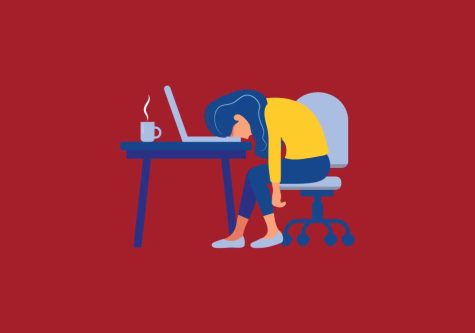Study Says Students Withdraw From Classes Cited Towards Mental Health

Students were being torn apart.
Every semester just seems to get rougher, more complex, and more draining each time. It seems like they cannot handle all the lectures, assignments, and tests. Not only were college students stressed enough, but after Covid- 19 it completely changed a student’s life. Students had to leave their campuses, leave all their belongings and not even mention their dorm appliances that remained untouched in storage. Some students were not even able to meet their roommates because all of their social life was taken away.
Next students had to learn a new way to live their college life. Lectures were through Zoom, the engagement happened through emails, and their dorm life was in their own bedrooms. It was just so abrupt for students that they did not know how to wrap their heads around this while still having midnight assignments due on Blackboard. This caused many to feel stressed and overwhelmed and it led students to withdraw from their classes.
The question of whether to withdraw or not to withdraw from courses has always loomed as a major decision. A new study from Penn State claims that mental health and counseling are one of the main reasons students choose to drop a class.
The report stated that nearly 5,000 students who withdrew from courses were in counseling and seeking treatment for their mental health, and that depression, anxiety and stress were key factors in dropping a course or withdrawing from a college.
Colleges often battle to keep students enrolled and on campus and some will drop out for a variety of factors from finances to home life to interests changing. But mental health challenges are a leading cause as well.
“Students who had received past mental health treatments generally withdrew at a higher rate than the average student in on-campus counseling; those who had been admitted to psychiatric hospitals or treated for alcohol or drug abuse were almost twice as likely to withdraw, with 5.1 percent of each group stopping out,” cited the report.
Students who self-reported depression (3.5 percent) and anxiety (3.2 percent) were near the top of the list, but academic stress (4 percent) topped the charts.
Factors to combat these challenges, said the report, were family support, having a job or engagement in extracurricular events.
Some demographic groups have a higher degree of withdrawal. Gender-diverse students (3.9), disabled students (3.7) and first-generation students (3.6) percent lead the list, said the report.
Yairis Ramos is a Mercy College student who was enjoying her first year in college. She made new friends, did afterschool activities, and was trying to adapt to her new life as a college student. At the beginning of her spring semester, her life changed. She was forced to leave her dorm and her roommates, she had to take all of her dorm accessories back home after spending her savings on dorm appliances. She felt hopeless going back home and felt like needed support to continue her remote classes. Yairis missed deadlines and could not handle all of the assignments at once. Luckily she found a therapy session through Mercy but, felt like it was not exactly how she thought it would be.
Yairis expressed that “It was not beneficial to me I didn’t get the help that I needed.” She also mentioned that it was just a six-session course out of these she only went to two sessions because noticed it was not the help she needed.
Shiland Griffin is one of Mercy’s PACT mentors who has been working there for eight months and assisting students as an academic advisor to help students with their entire college experience. Griffin mentioned that he is responsible for 150 – 200 students and has to make sure each student stays on track.
In a single day, Shiland mentioned “Depending on the period, I talk to 30 to 50 students per day.”
Out of those 200 students he claimed that “10 to 20 students withdraw from at least one class.” He mentioned that some students withdraw because sometimes these courses might be too overwhelming for them or sometimes they just might withdraw for personal reasons.
He also speaks to his students allowing them to express how they feel about the course and why they might feel this way but he also reminds them that there are many tools to help students pass their classes.
“What we like to do is that we like to work with them, to see if they don’t withdraw from the class, obviously if it is a personal situation and the student needs to withdraw its understandable, But if they are struggling with the class we could offer them tutoring and the resources needed for tutoring.”
There are always two sides to why students feel the need to withdraw. Yairis claims that she felt there was a lack of resources to help her through the semester which made her withdraw from her class. While Shiland claims that there are resources for students to help them through the course.

Laura Medina is a Communication Studies major at Mercy College and is 21 years old. She is interested in the Media and Entertainment industry. She would...












